Iron is one of the most important nutrients for maintaining your health. Including plenty of iron-rich vegetables in your diet is a great way to ensure you don't develop a deficiency.
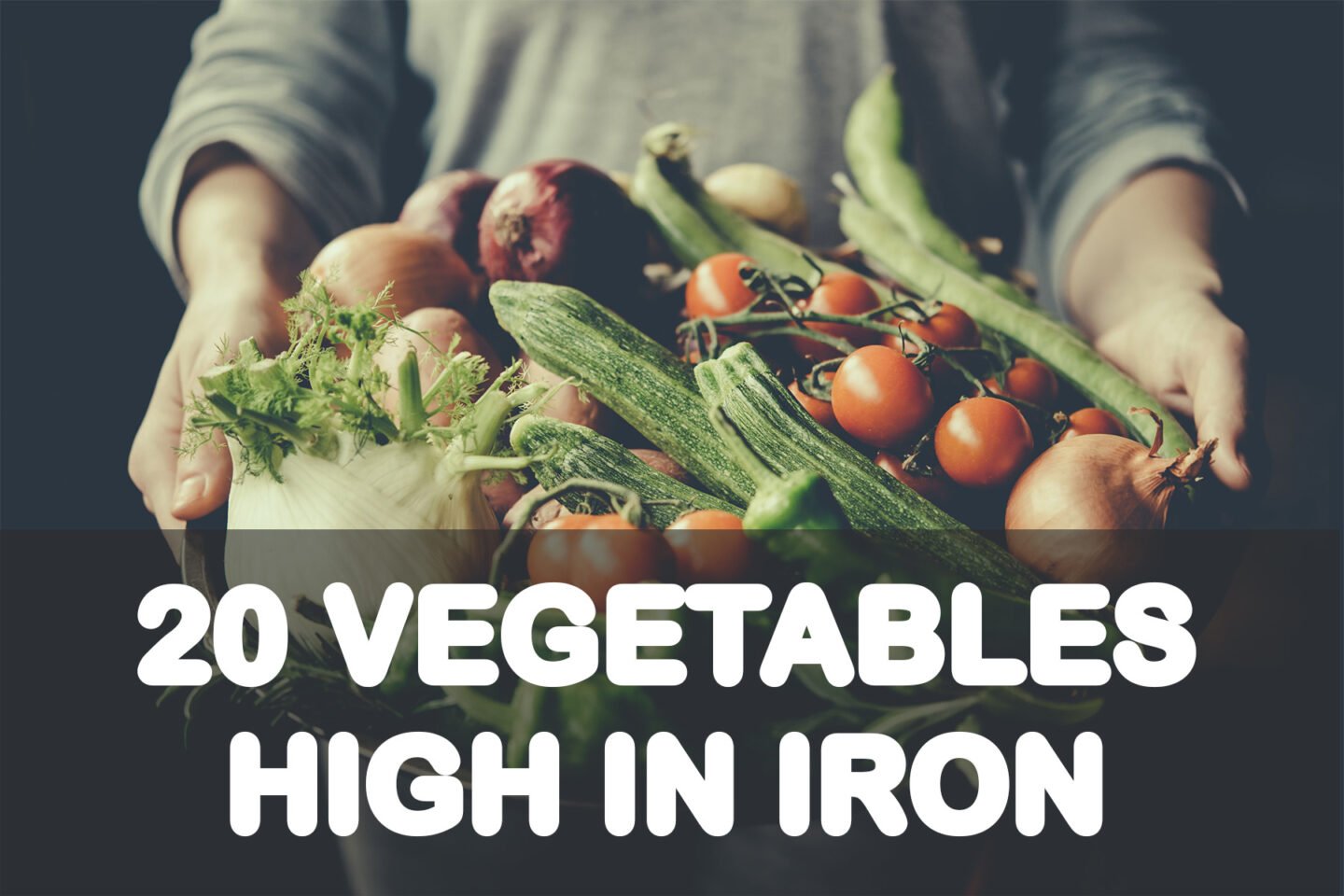
The heme iron found in animal products is easier for your body to absorb than the non-heme type found in fruits and vegetables. However, eating plenty of iron-rich vegetables can help ensure you get all the iron you need, and they're full of other nutrients too.
The vegetables highest in iron are cruciferous vegetables, which include broccoli, brussels sprouts, and cabbage. But there are many others you could add to boost your iron intake.
Besides iron, vegetables are a great source of fiber, antioxidants, vitamins, and minerals. These nutrients and plant compounds are essential for good health and well-being, reducing your risk of developing health problems.
Most vegetables contain some iron, but often a small amount.
The twenty I've listed below are much higher in iron than other vegetables.
Table of Contents
20 Vegetables High in Iron
1. Broccoli
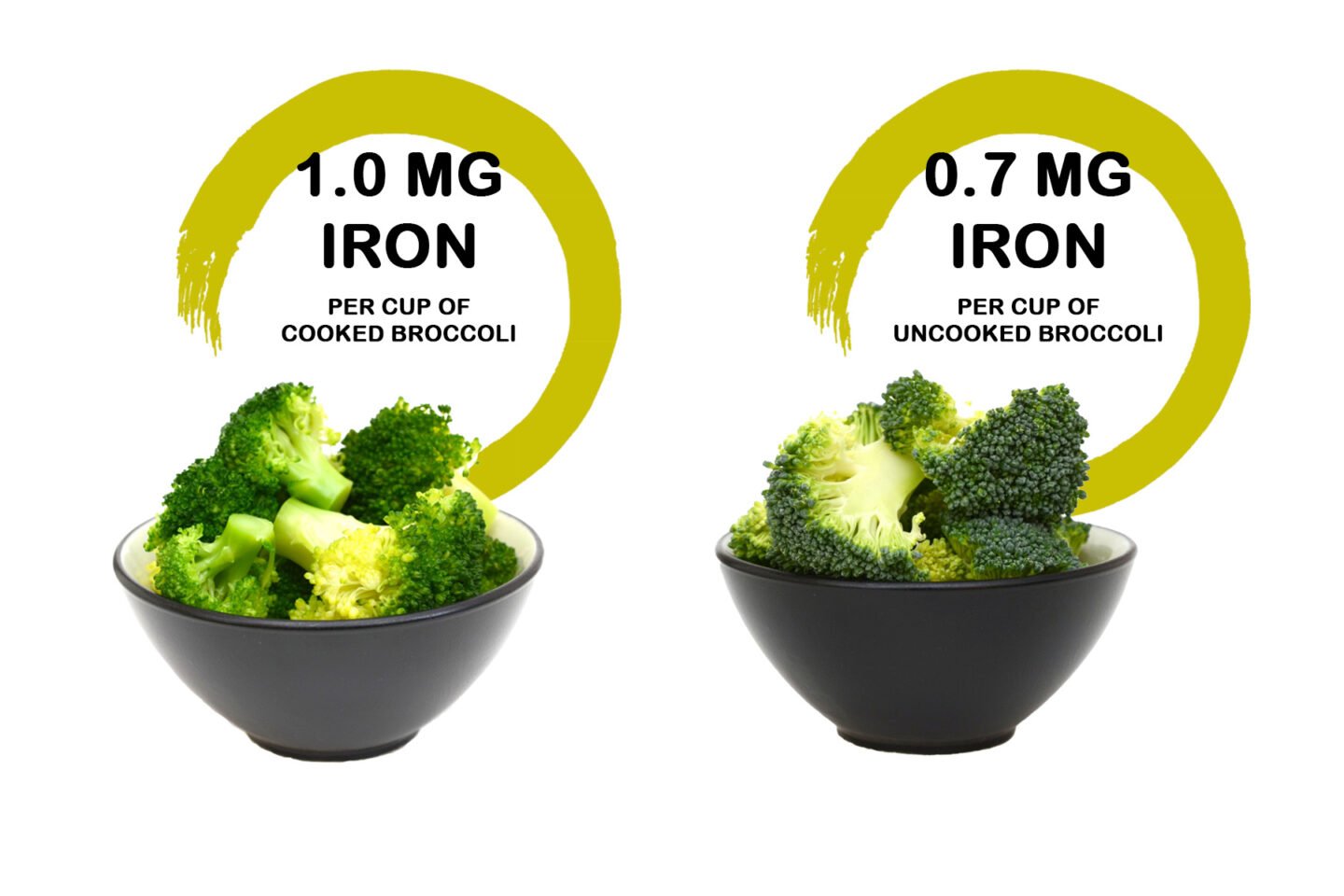
One cup of cooked broccoli contains about 1 mg of iron, and one cup of raw broccoli contains 0.7 mg of iron. This makes broccoli one of the best vegetable sources of iron.
Broccoli also contains a lot of fiber, some protein, and plenty of vitamins and minerals, including vitamin C, vitamin K, folate, manganese, and potassium.
The vitamin C in broccoli helps your body absorb the non-heme iron found in vegetables.
Broccoli is also rich in antioxidants that may help prevent chronic conditions, including cancer, diabetes, and heart disease.
2. Potatoes
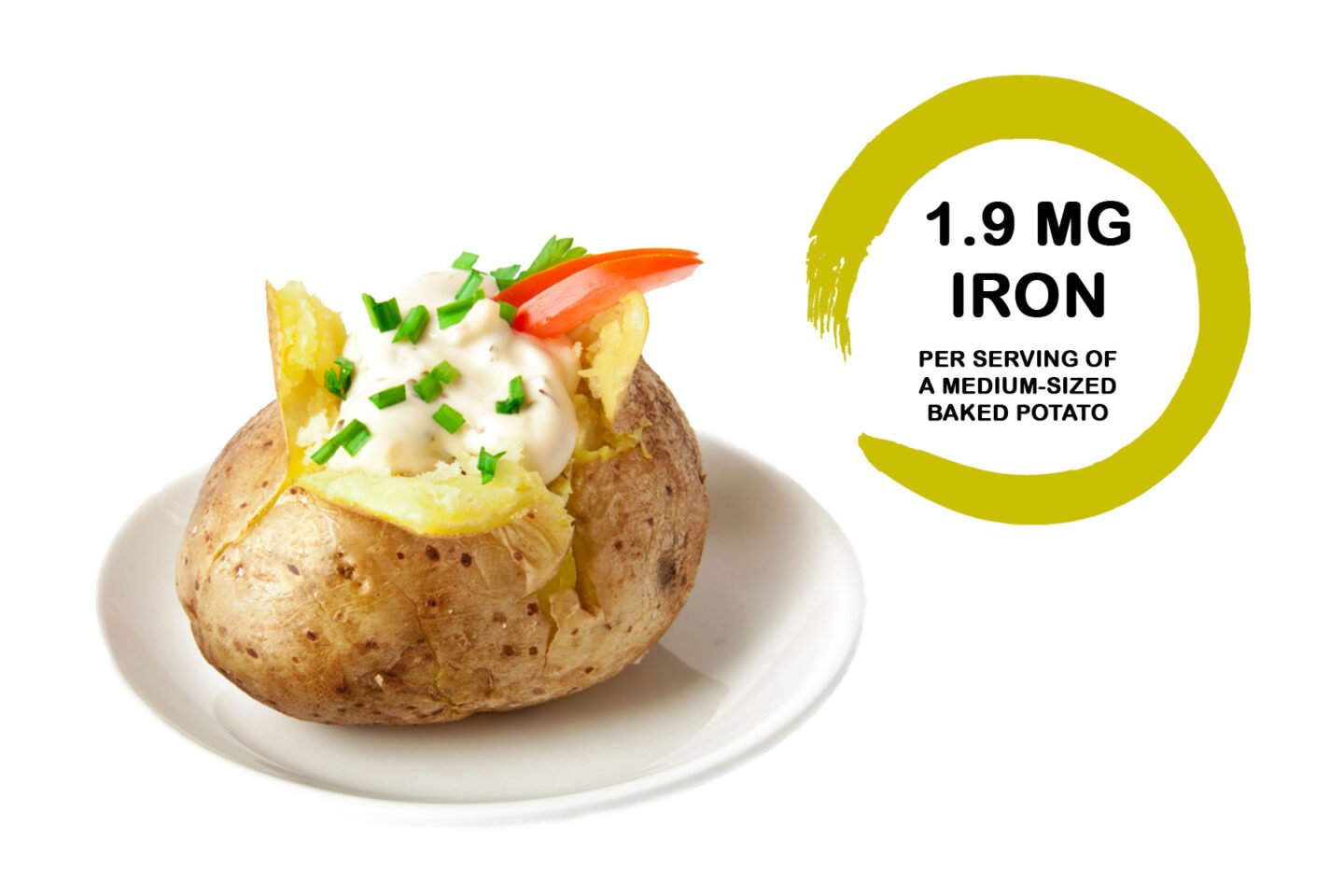
Potatoes are low in calories, and one medium-sized baked potato contains about 1.9 mg of iron.
Just like broccoli, potatoes also contain a lot of vitamin C to help with iron absorption.
What’s more, potatoes are rich in other nutrients, especially fiber. Eating baked potatoes, especially with the skin on, can help improve your digestion, prevent weight gain, and feed the good bacteria in your stomach.
Adding potatoes to your diet also increases your intake of vitamin B6, niacin, folate, potassium, and manganese.
3. Sweet Potatoes
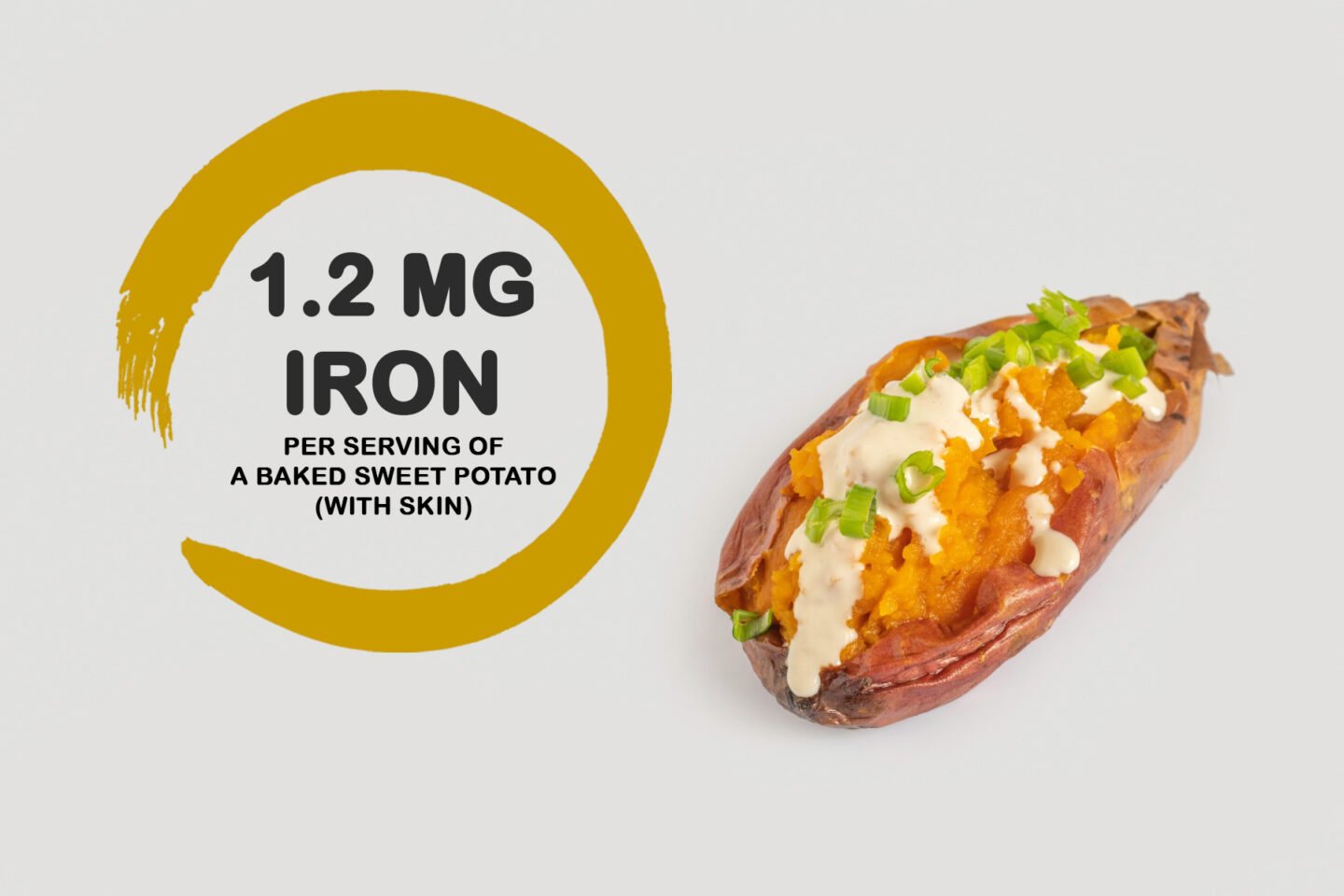
Like regular potatoes, sweet potatoes are rich in iron. One serving of sweet potato baked with the skin on contains 1.2 mg of iron, about 7% of the recommended daily intake.
Sweet potatoes also contain vitamin C, vitamin A, vitamin B6, pantothenic acid, magnesium, copper, and other nutrients. They’re also rich in antioxidants that help keep you healthy.
So, they are a delicious addition to a healthy, balanced diet.
4. Brussels Sprouts
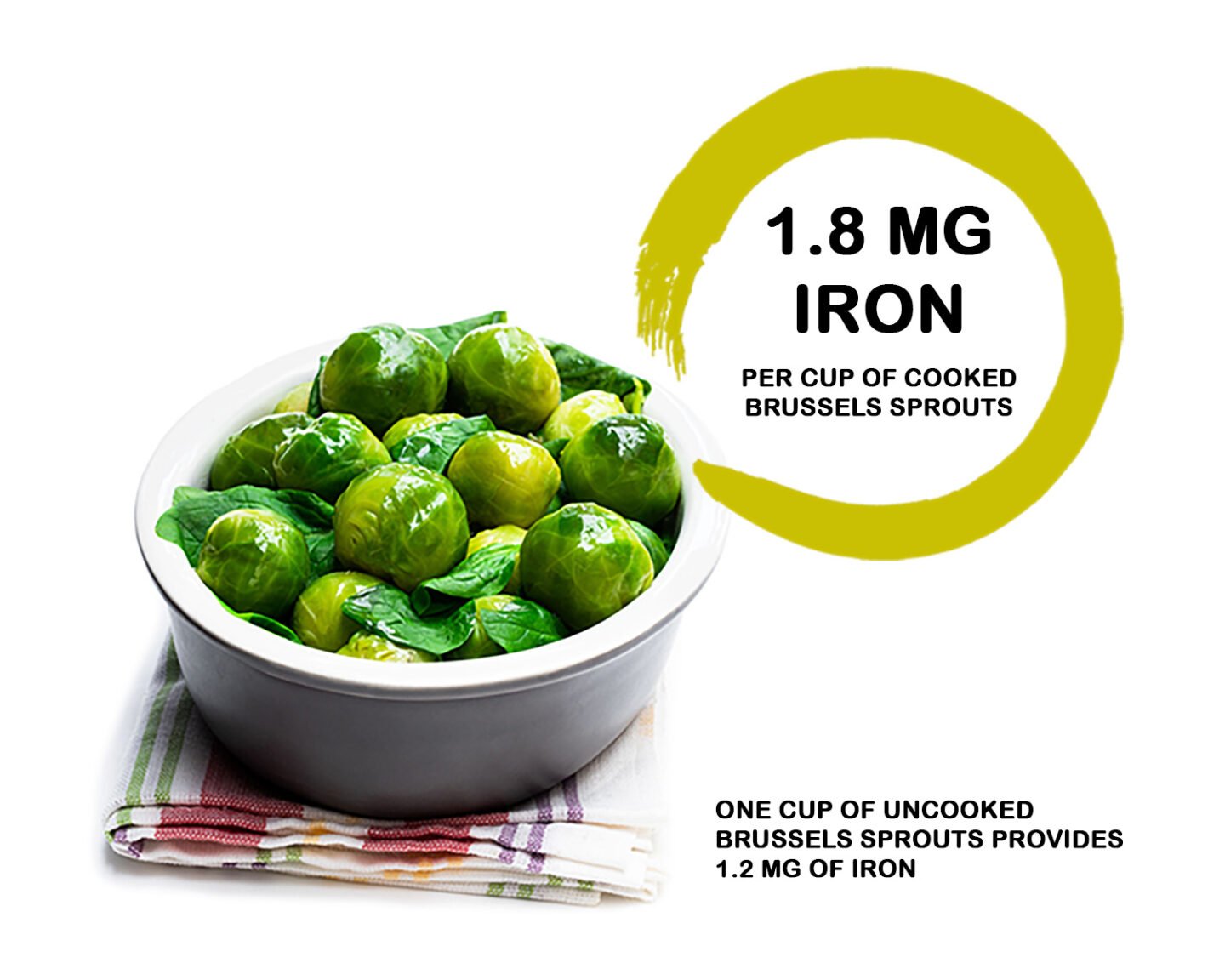
A one-cup serving of cooked brussels sprouts contains about 1.8 mg of iron, 10% of the recommended daily intake. The same sized serving of raw brussels sprouts provides about 1.2 mg of iron.
Brussels sprouts also contain vitamin C and are a good source of folate and copper, which help prevent anemia. They also contain a lot of fiber, vitamin K, vitamin A, phosphorus, and magnesium.
Adding brussels to your diet is great for your cardiovascular health.
5. Tomato
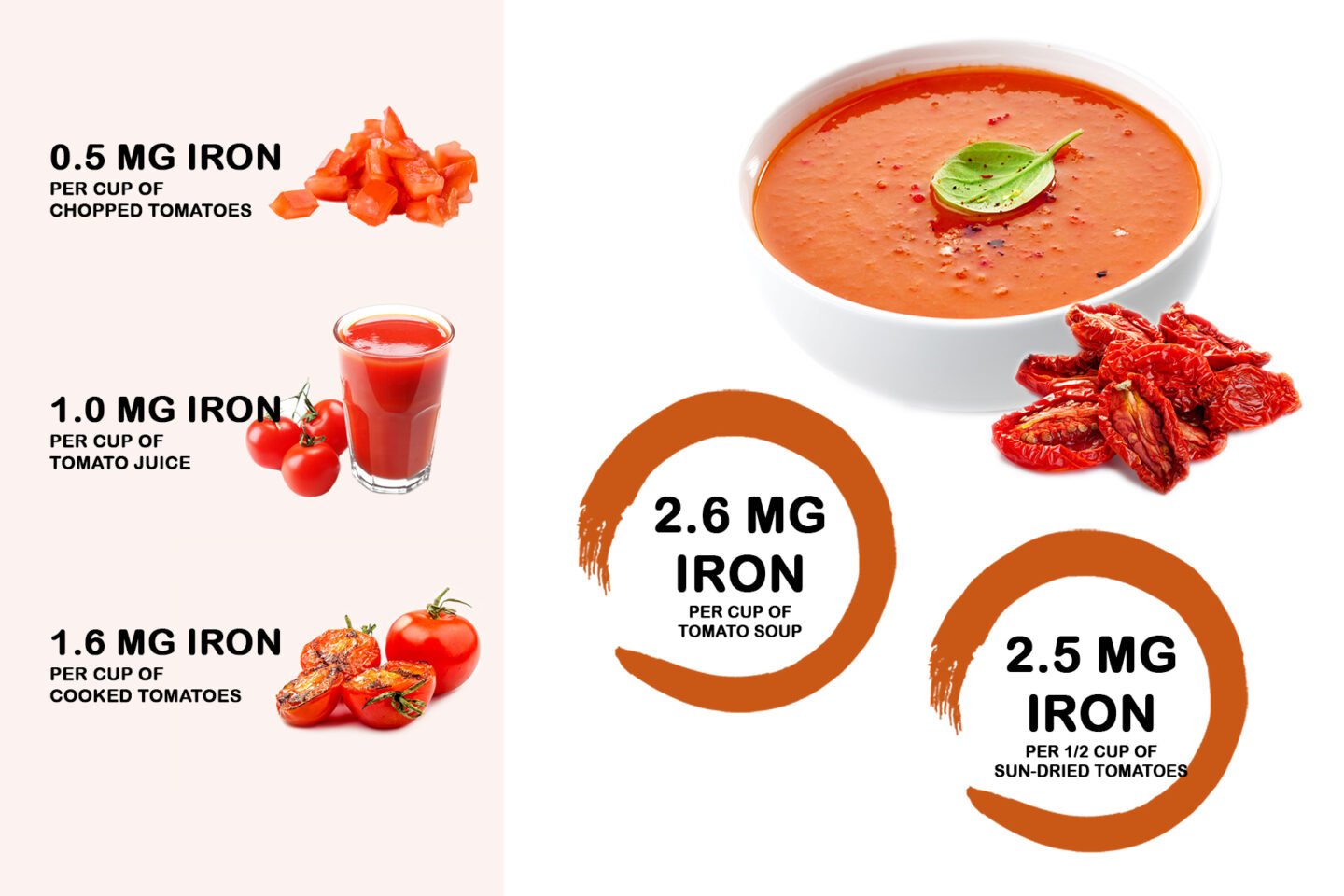
Although they are a fruit, tomatoes have made this list because they are mostly served as vegetables and are rich in iron. One cup of chopped tomatoes contains around 0.5 mg of iron.
One cup of cooked tomatoes provides you with 1.6 mg of iron, 9% of the recommended daily intake.
Tomatoes are also rich in vitamin C, fiber, vitamin A, potassium, and manganese. They also contain powerful antioxidants, such as lycopene, that lower your risk of certain types of cancer.
Sun-dried tomatoes are especially high in iron, giving you 2.5 mg of iron in a ½-cup serving. However, like most dried fruits, they contain a lot of sugar so eat them in moderation.
What’s more, other tomato-based products are high in iron too. For example, tomato juice contains 1 mg of iron in a one-cup serving, and one cup of tomato soup provides you with 2.6 mg of iron.
6. String Beans
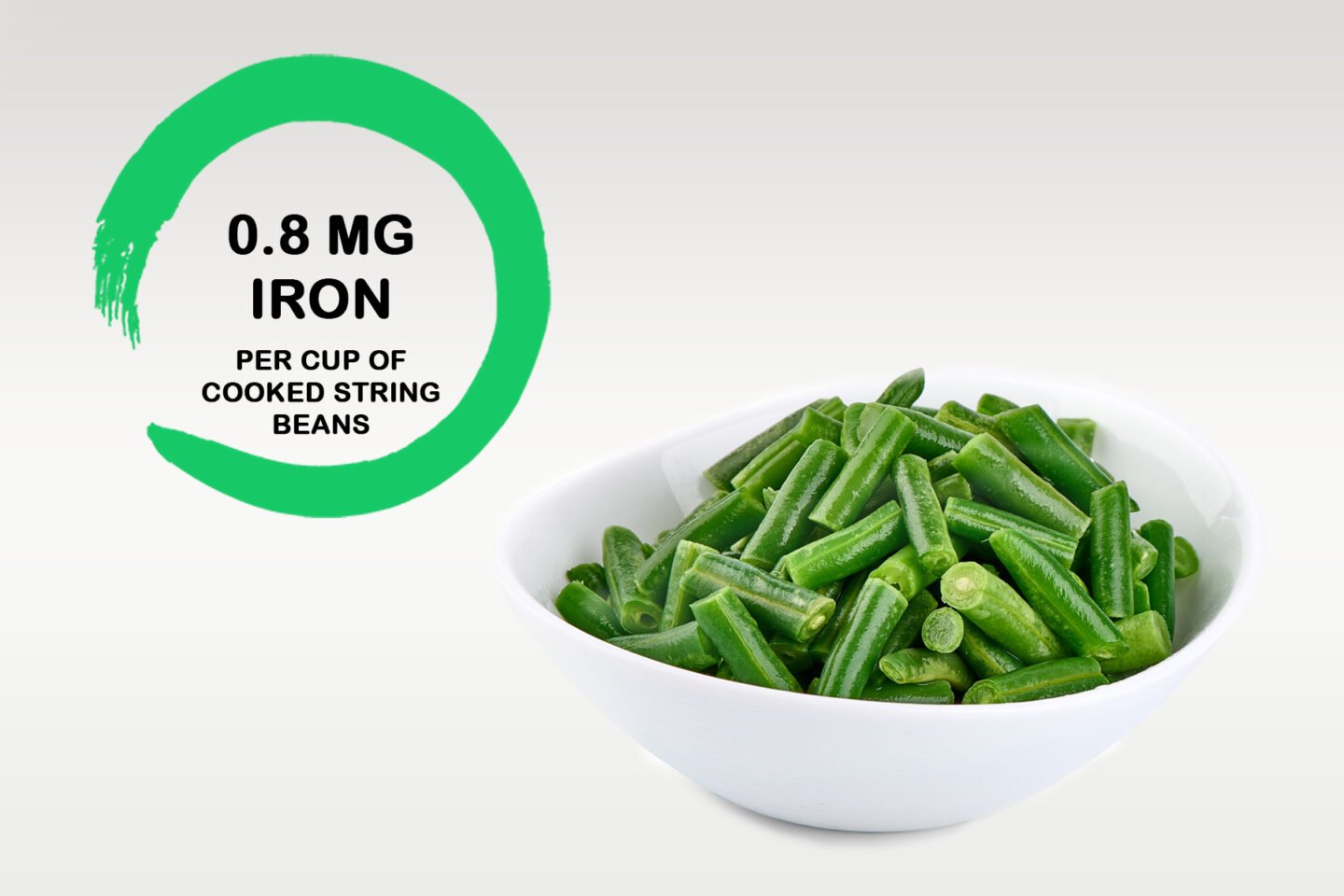
One cup of cooked string beans contains around 0.8 mg of iron, or 5% of the recommended daily intake. With a calorie count of just 44 calories, string beans are a great source of iron.
String beans are also a great source of vitamin C, fiber, vitamin A, vitamin K, folate, manganese, and magnesium.
7. Red Cabbage
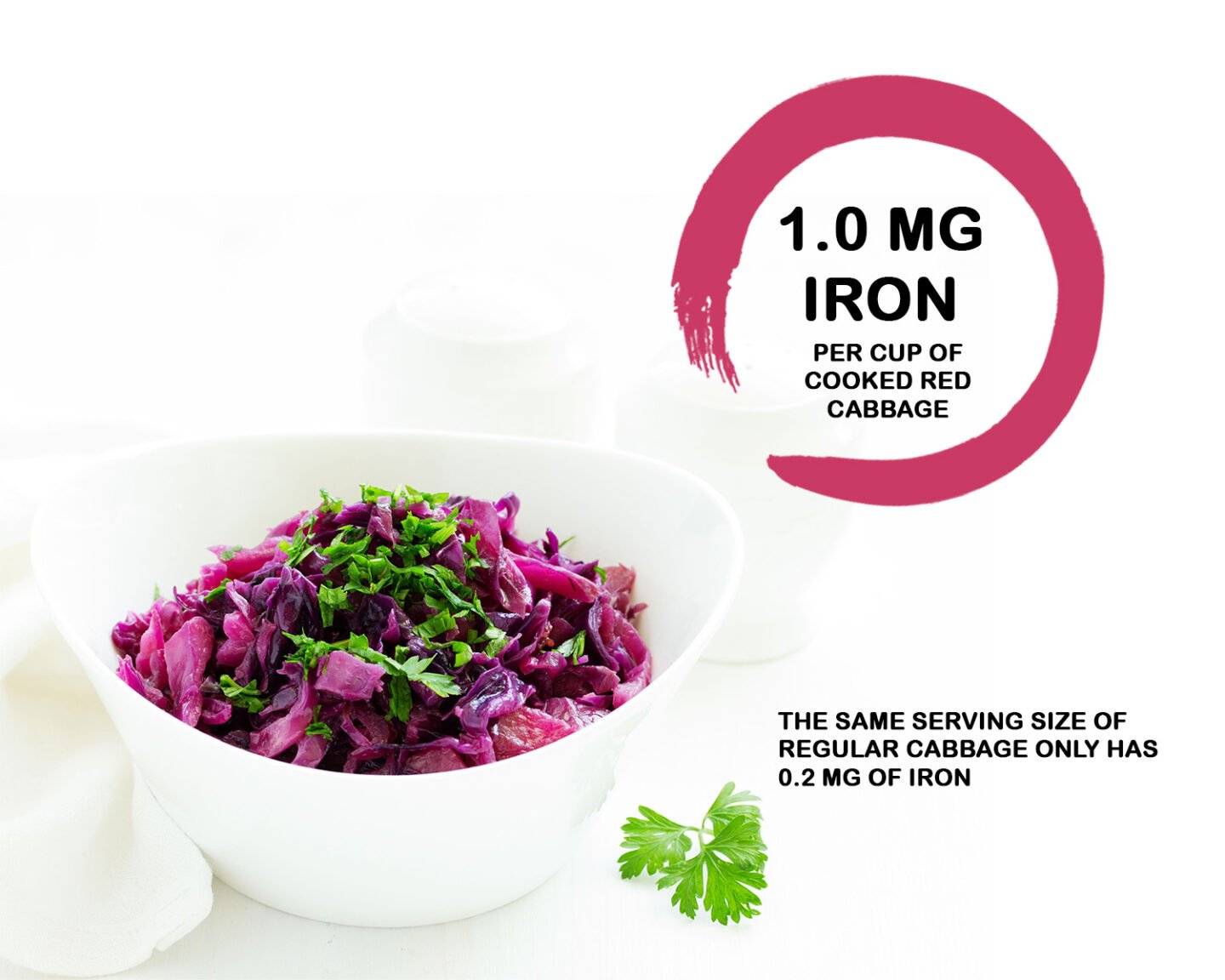
One cup of cooked red cabbage contains about 1 mg of iron. However, regular cabbage only has about 0.2 mg of iron in the same serving.
Cabbage also contains a lot of vitamin C, folate, and some copper, all nutrients that help prevent anemia and iron deficiency.
Cabbage is also high in fiber, antioxidants, vitamin K, vitamin B6, manganese, and potassium.
8. Spinach
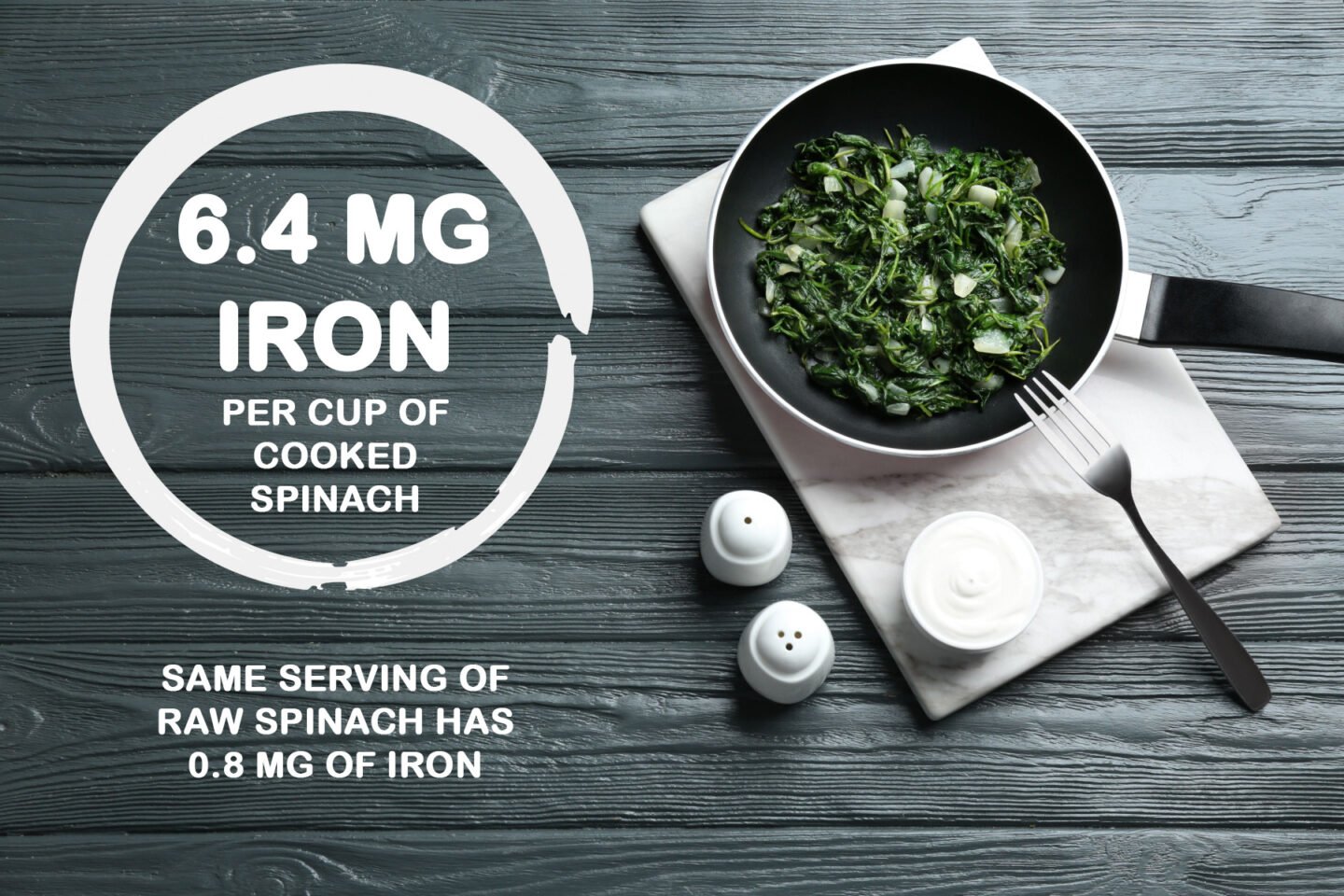
One cup of cooked spinach provides you with 6.4 mg of iron, 36% of the recommended daily intake. The same serving eaten raw contains 0.8 mg of iron.
Other nutrients found in spinach include vitamins A, C, and K, folate, manganese, and magnesium.
Spinach is also an excellent source of various antioxidants, which help flush out free radicals from your body and reduce your risk of several chronic conditions.
9. Mushrooms
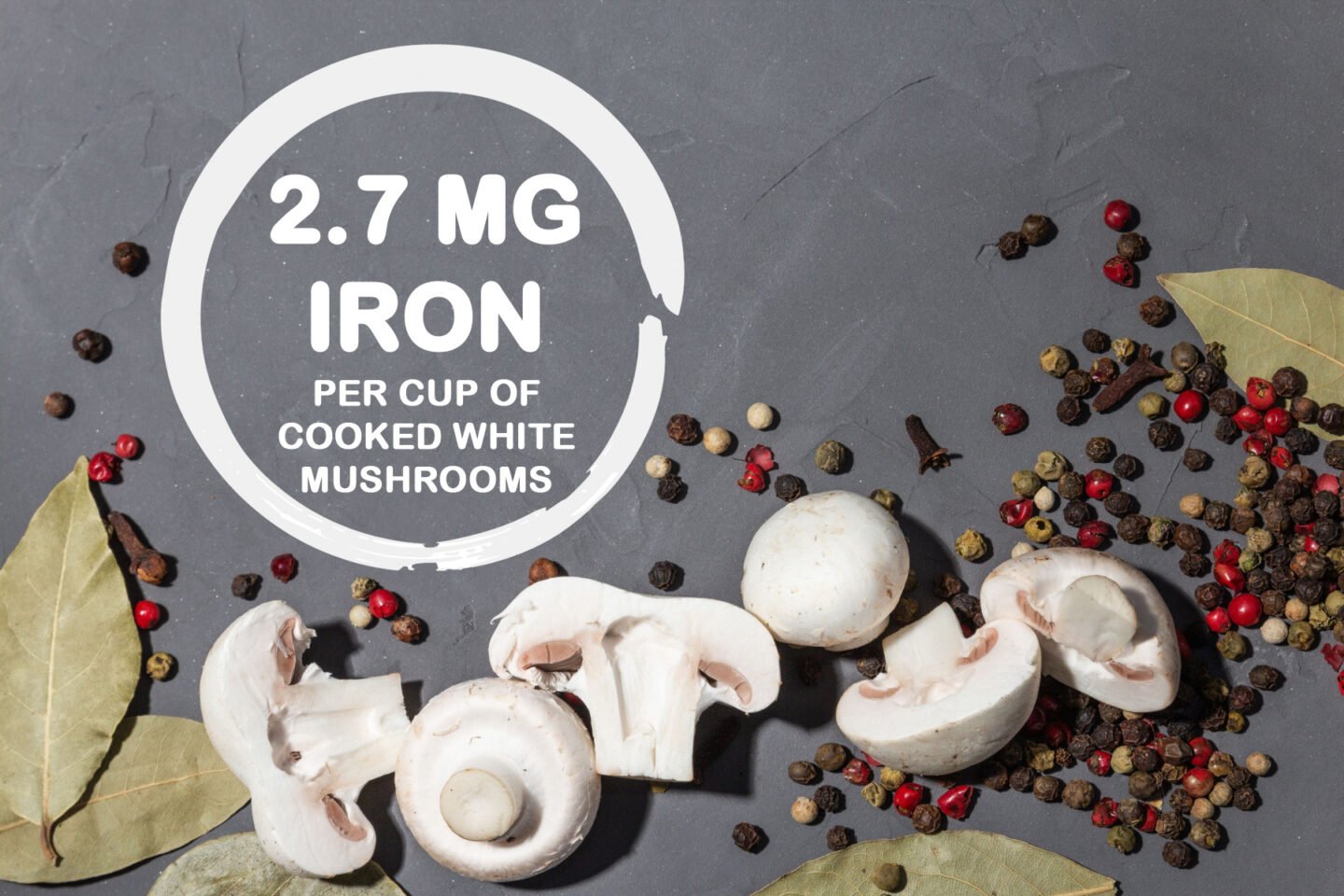
Mushrooms are fungi, but like tomatoes above, they've earned their place on this list as they're served as a vegetable and are high in iron.
One cup of cooked white mushrooms contains 2.7 mg of iron, which is around 15% of the recommended daily intake. The iron content of other mushroom varieties may vary.
White mushrooms are also a pretty good source of fiber, vitamin C, riboflavin, niacin, pantothenic acid, potassium, and copper.
10. Asparagus
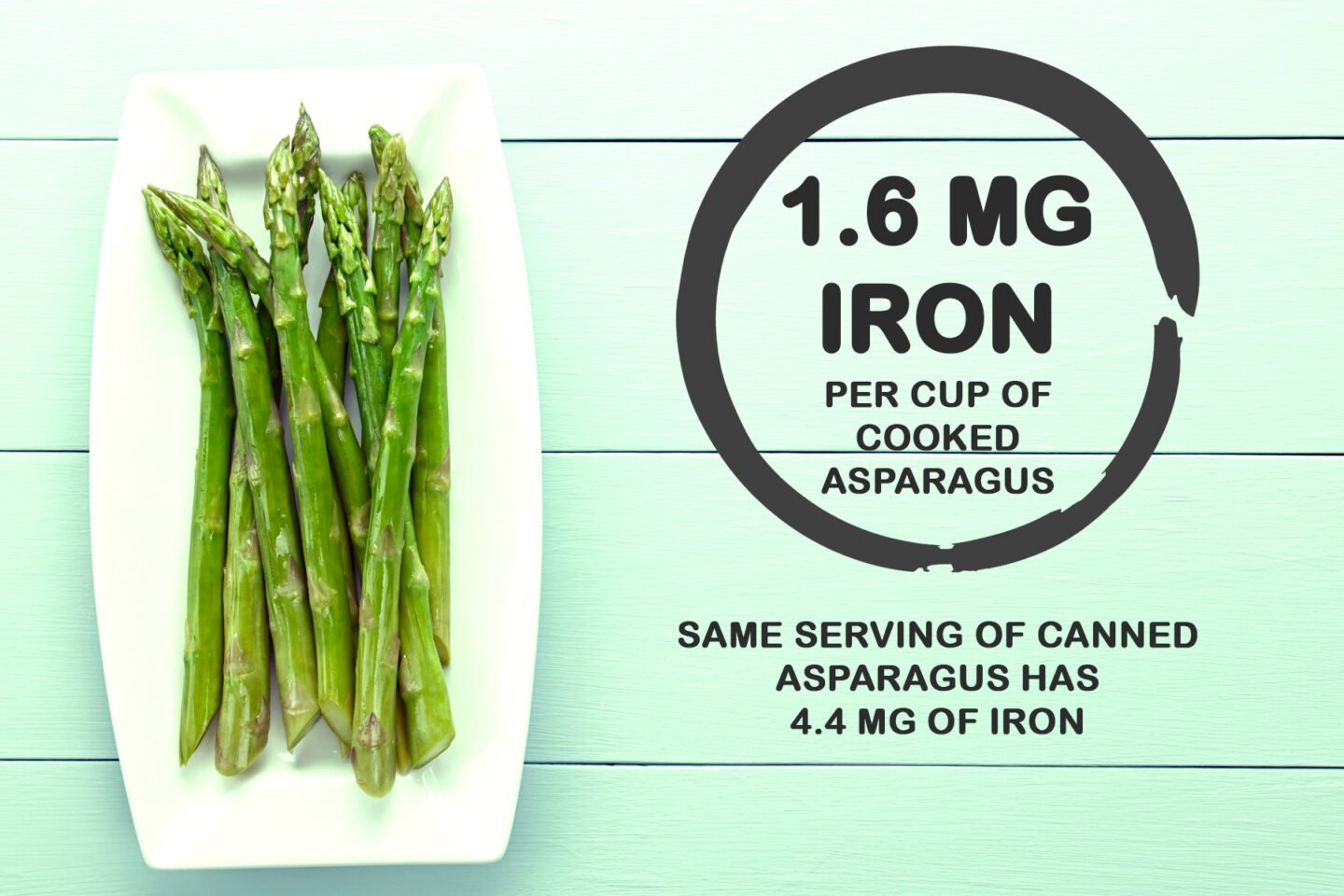
A one-cup serving of cooked asparagus contains around 1.6 mg of iron, or 10% of the recommended daily intake. A one-cup serving of canned asparagus contains 4.4 mg of iron, which equals 25% of the recommended daily intake.
Asparagus is low in calories and contains other nutrients, such as vitamins A, C, and K, thiamin, folate, and many important minerals.
Studies show that eating asparagus helps improve the health of your kidneys, aids weight loss, improves digestion, lowers blood pressure, and is a great food to add if you're pregnant.
11. Collards
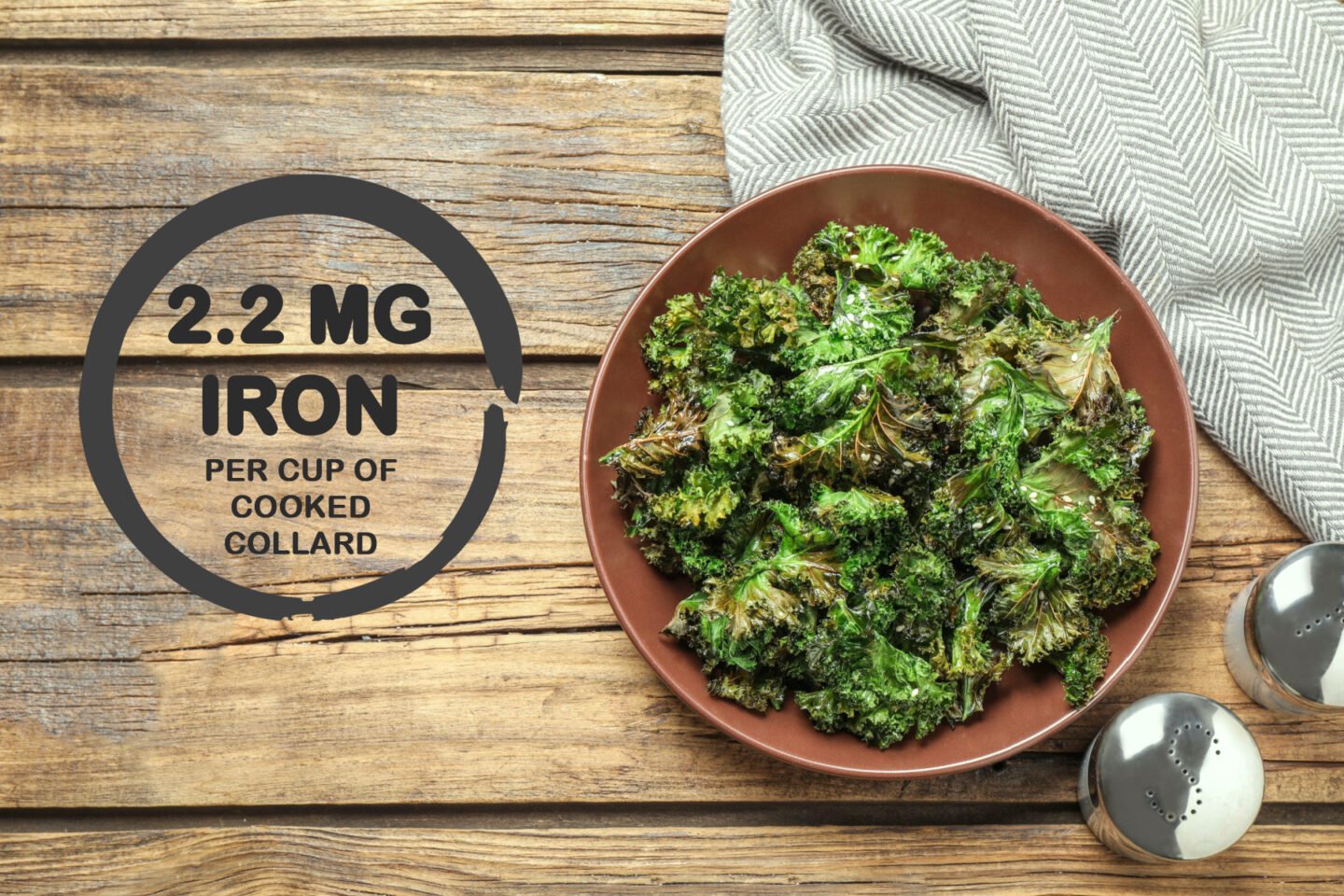
One cup of cooked collard greens contains around 2.2 mg of iron, about 12% of the recommended daily intake.
Collards also contain a lot of calcium, vitamins A, C, and K, magnesium, and manganese.
So, adding collards to salads and other meals can really contribute to a healthy, balanced diet.
12. Lentils
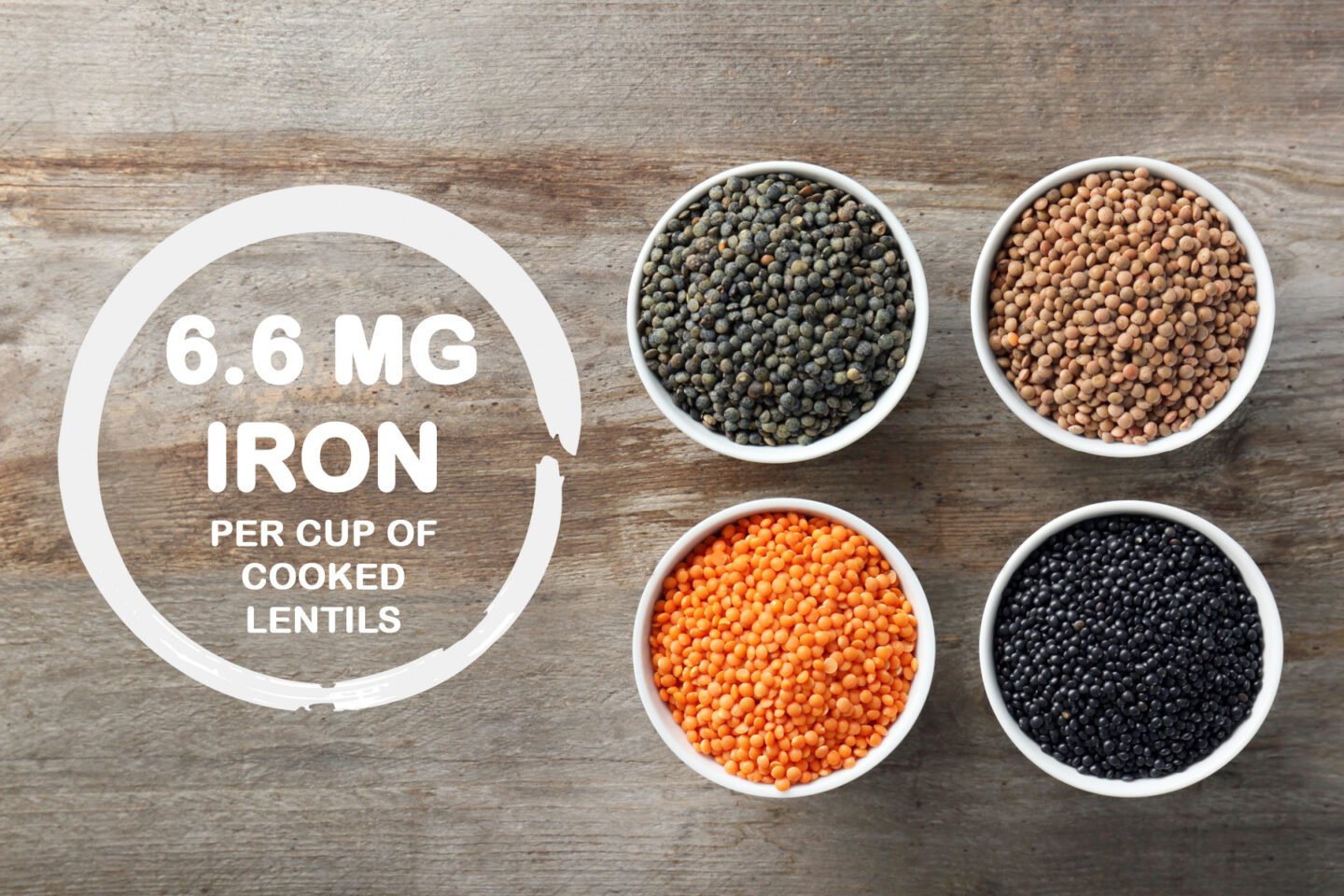
One cup of cooked lentils contains 6.6 mg of iron, 37% of the recommended daily intake.
Lentils are also a fantastic source of fiber, protein, B vitamins, magnesium, phosphorus, copper, zinc, and potent plant compounds. These are all greatly beneficial to your overall health.
13. Leeks
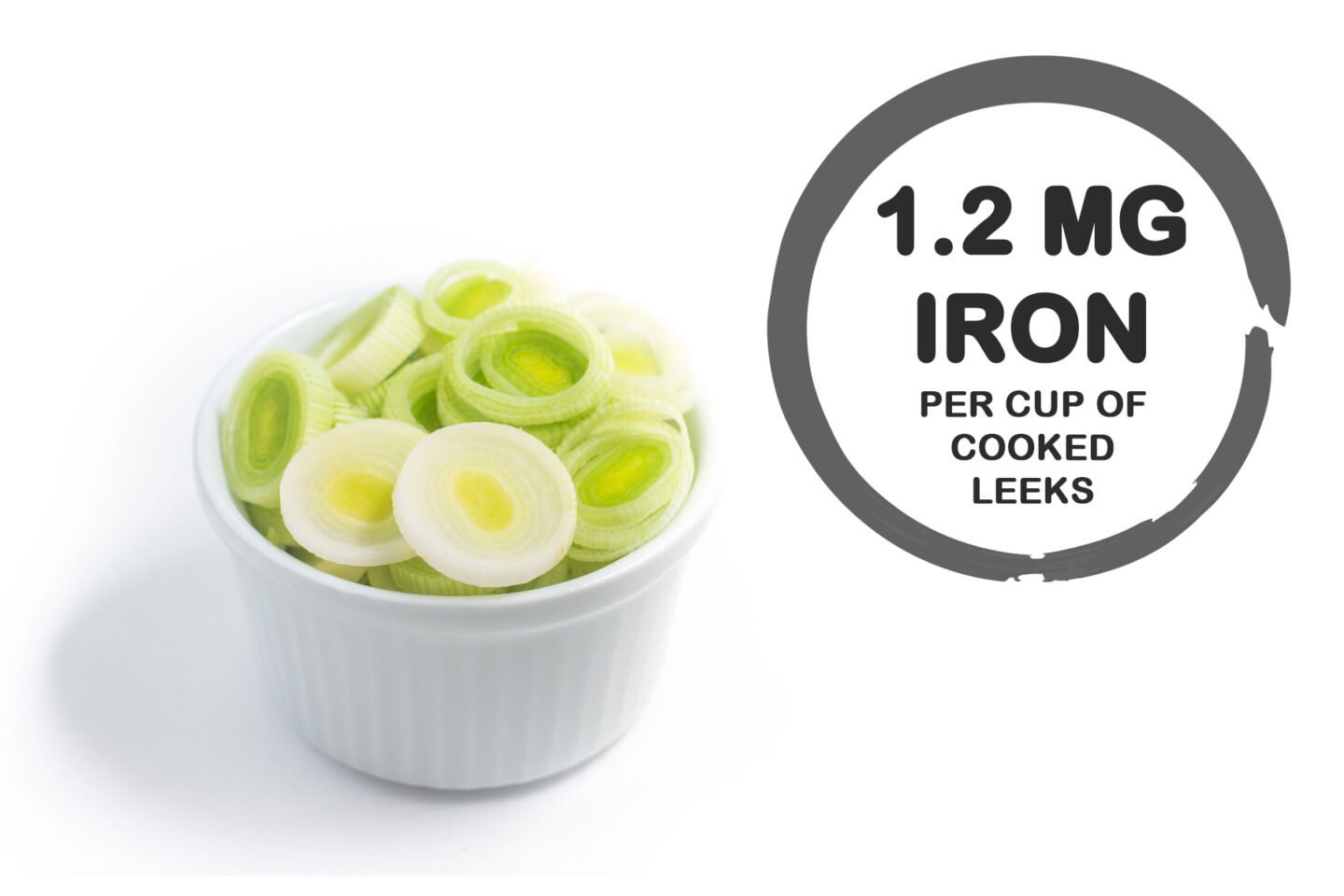
A one-cup serving of cooked leeks contains just 32 calories but gives you 1.2 mg of iron, 8% of the recommended daily intake.
Leeks also contain a good dose of vitamin C, manganese, vitamin A, and folate.
Studies show that leeks may improve digestion, aid weight loss, reduce inflammation, and combat certain types of cancer.
14. Artichokes
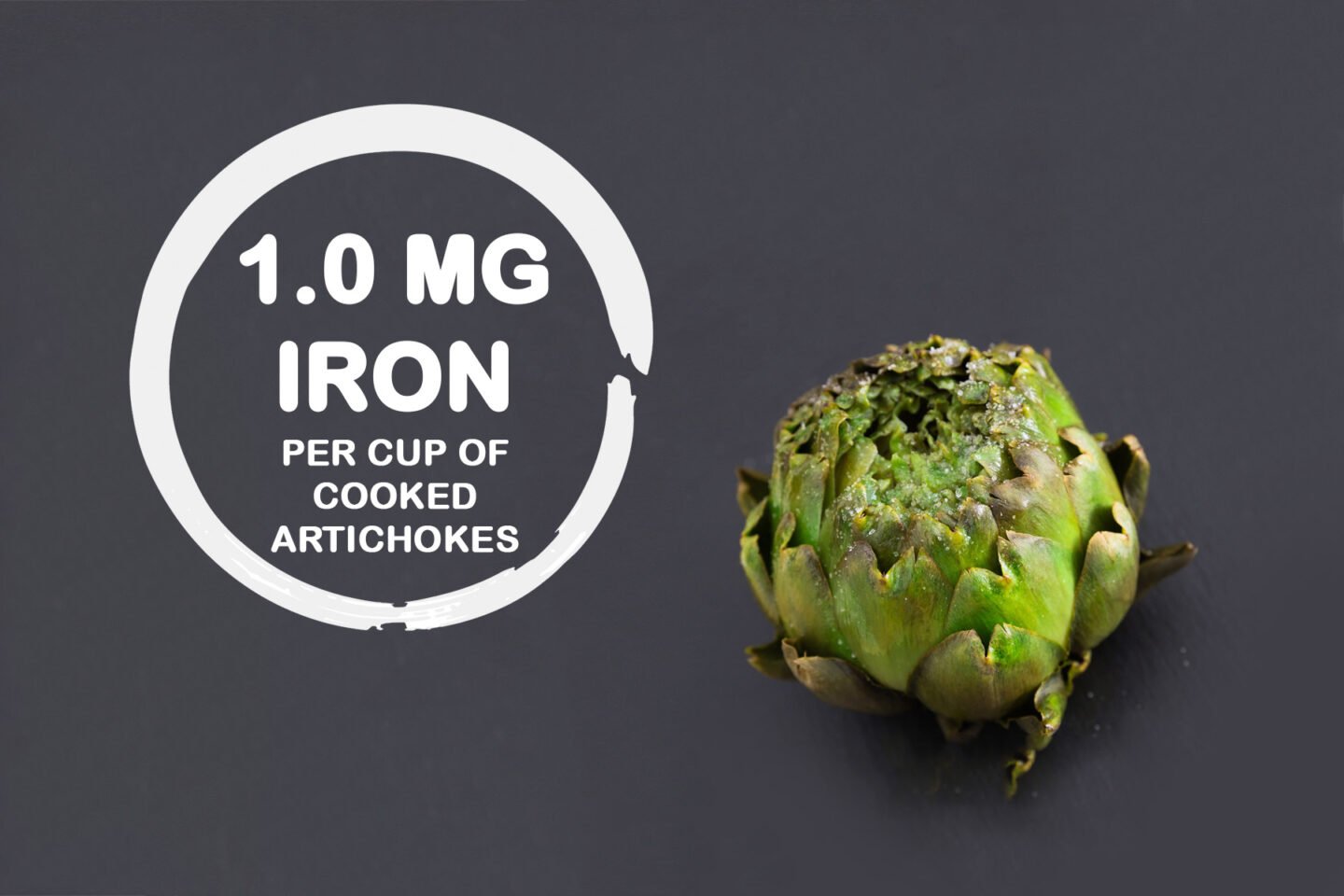
One cup of cooked artichokes contains 1 mg of iron, a lot of vitamin C, vitamin K, fiber, folate, manganese, and magnesium.
Studies have shown that eating artichokes can help regulate your blood pressure if you're hypertensive, improve blood sugar levels, and ease the symptoms of irritable bowel syndrome.
15. Kale
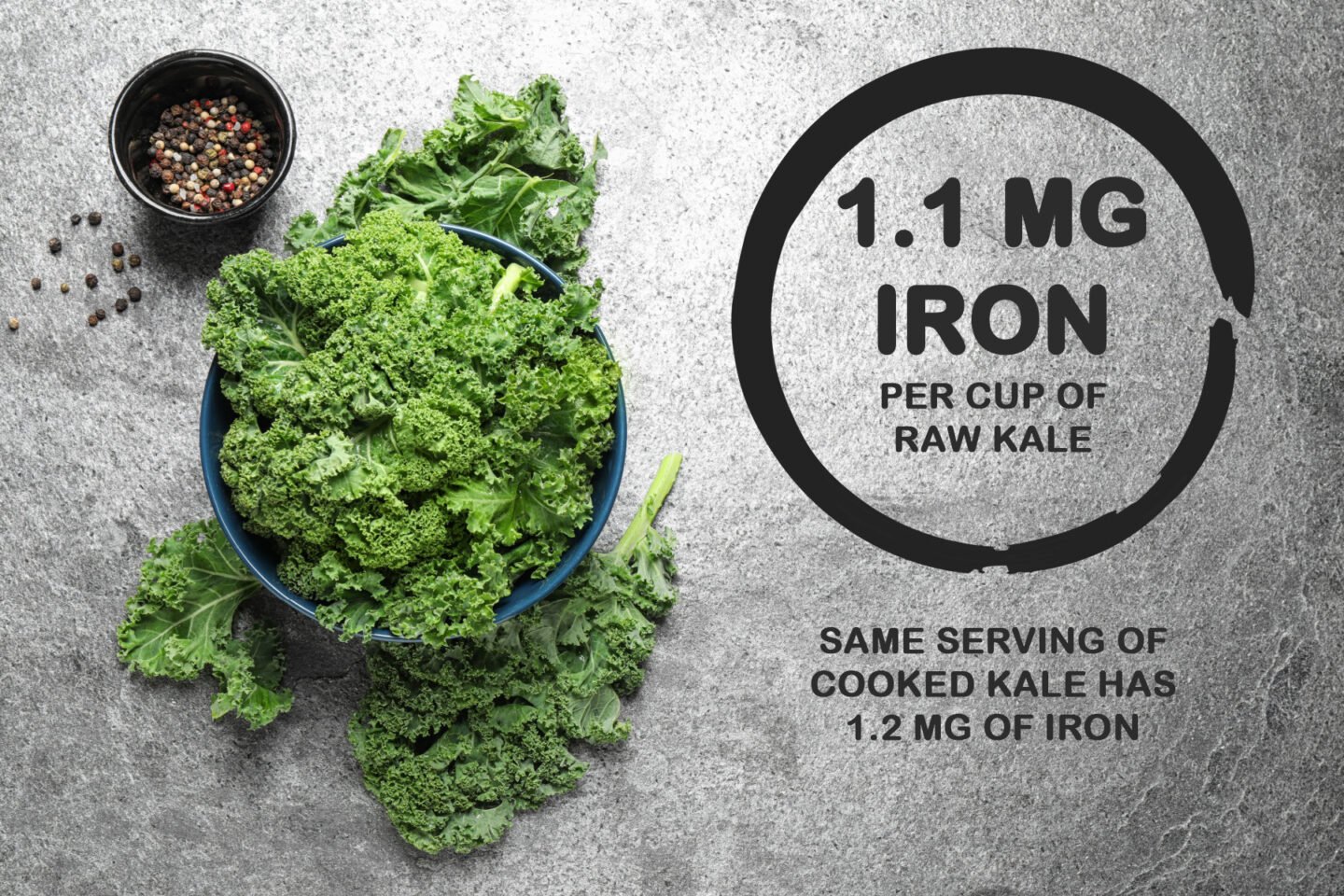
One cup of raw kale contains 1.1 mg of iron, and one cup of cooked kale contains 1.2 mg of iron.
Kale also contains a good amount of vitamins A, C, K, and B6. It also provides you with calcium, copper, manganese, and lots of powerful antioxidants.
16. Beets
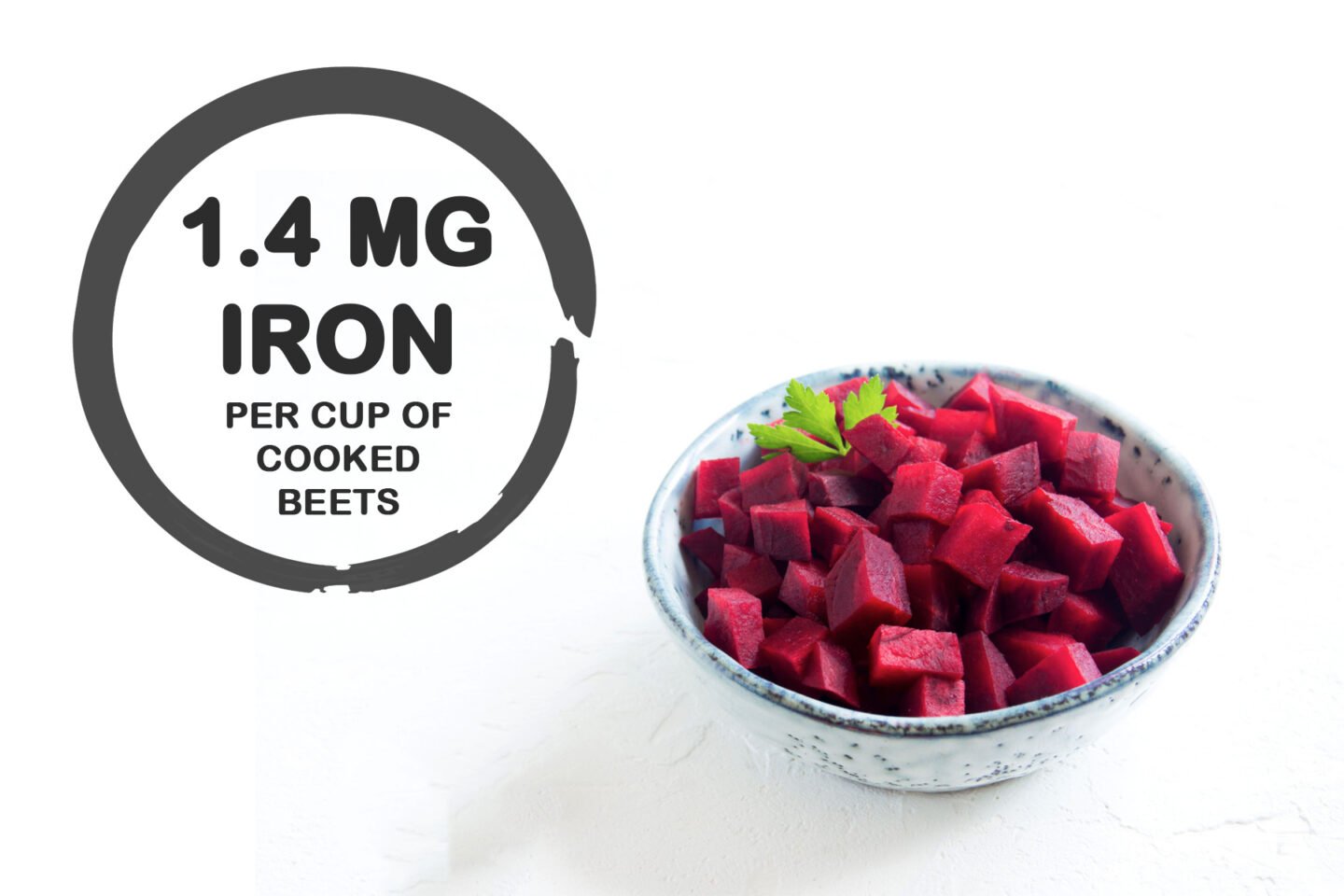
A one-cup serving of cooked beets contains 1.4 mg of iron, 8% of the recommended daily intake. They are also low in calories.
Beets also provide you with a lot of vitamins A, C, K, and B6, as well as calcium, manganese, copper, and potassium.
Several studies show that including beets in your diet can help fight inflammation and support brain health.
17. Beet Greens
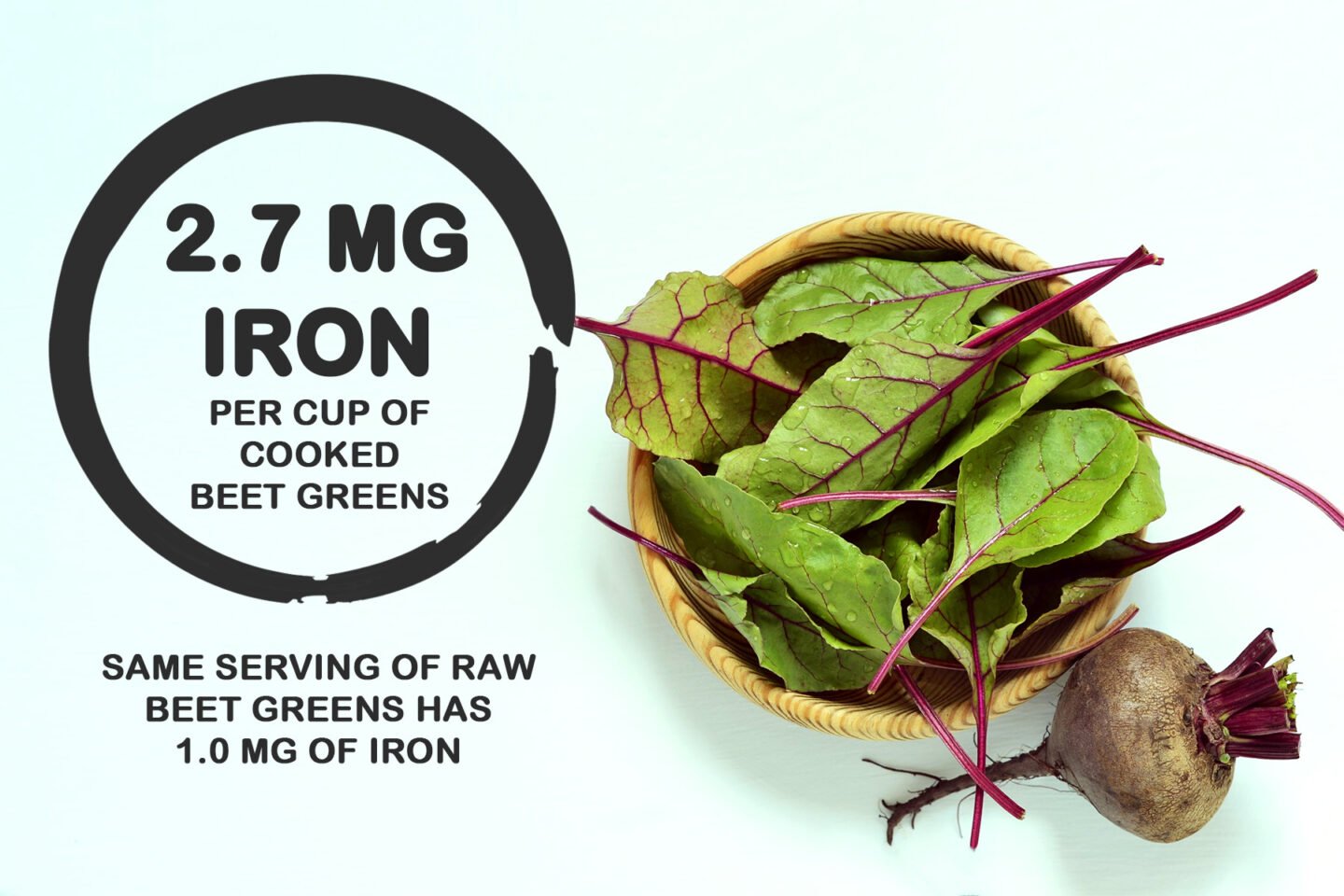
One cup of raw beet greens contains around 1 mg of iron, whereas one cup of cooked beet greens provides you with 2.7 mg, 15% of the recommended daily intake.
Beet greens are also a great source of vitamins A, C, E, K, and B6, as well as thiamin and folate.
They also provide you with a good amount of calcium, magnesium, potassium, manganese, and copper.
18. Dandelion Greens
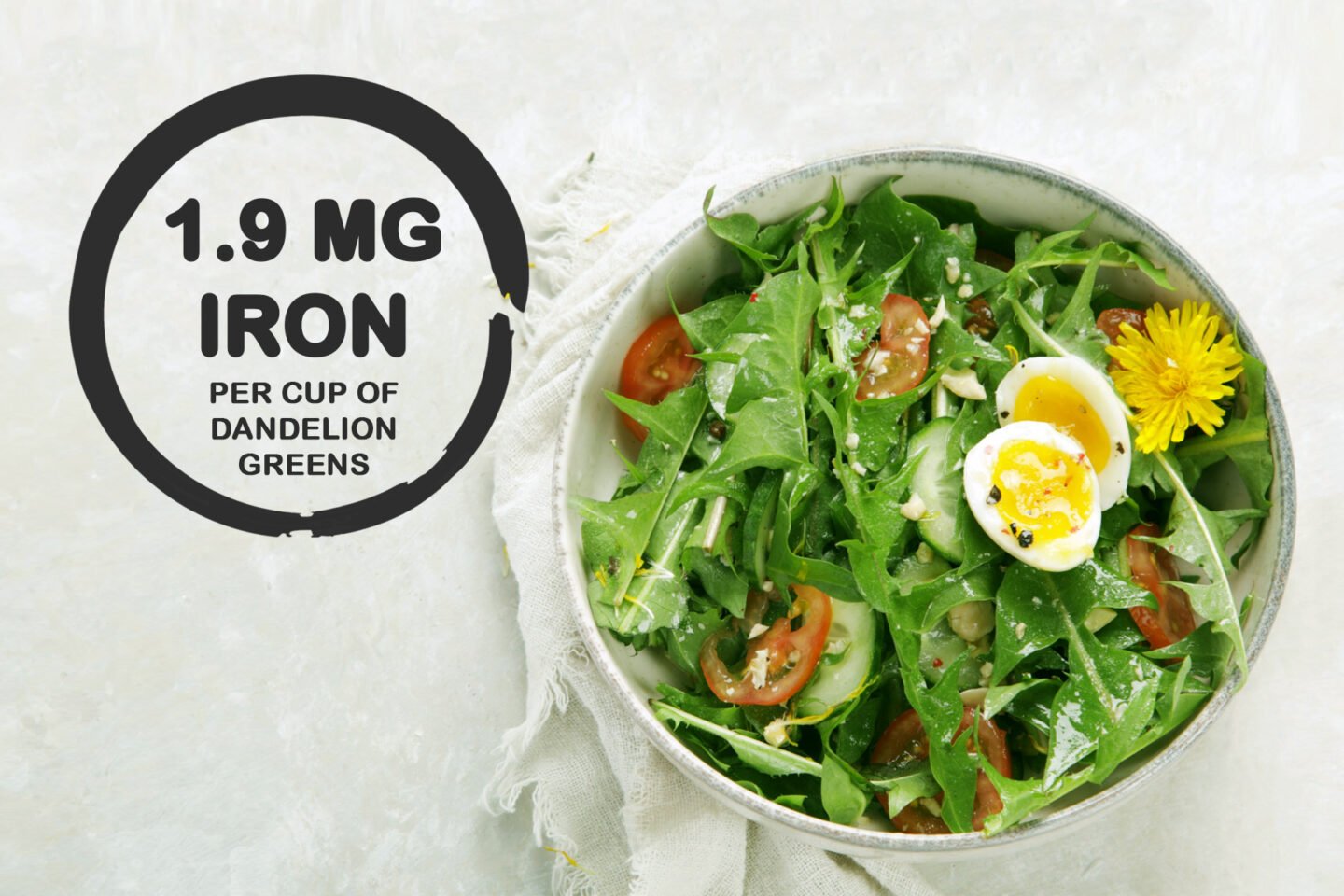
One cup of dandelion greens contains 1.9 mg of iron, about 10% of the recommended daily intake. At just 35 calories, this leafy green is a fantastic source of this important mineral.
Other nutrients found in dandelion greens include vitamin A, vitamin C, vitamin K, riboflavin, calcium, and manganese.
According to research, dandelion greens can reduce inflammation, regulate blood pressure, and lower cholesterol levels.
Dandelion greens are an unusual, tasty addition to a healthy, balanced diet.
19. Kidney Beans
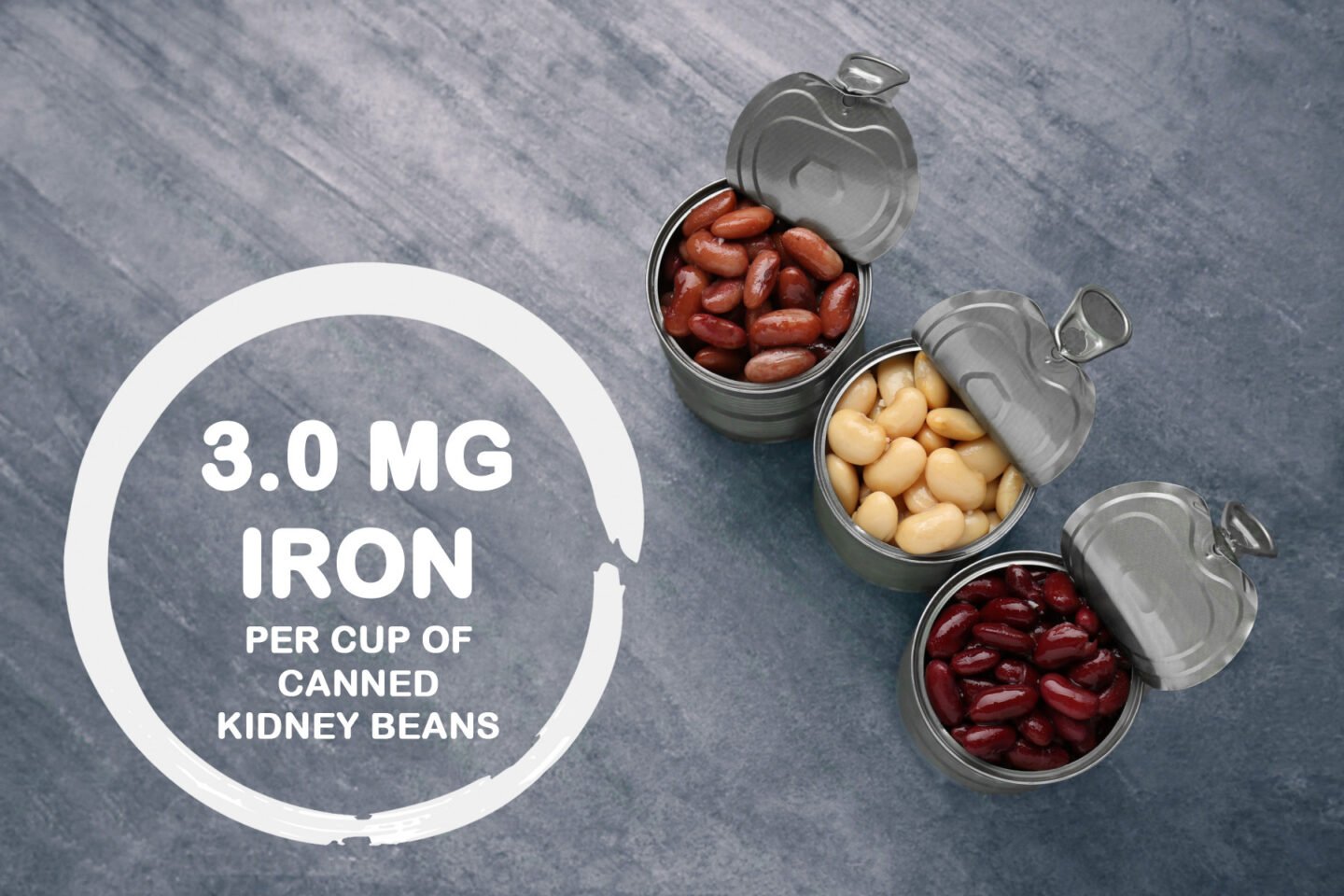
One cup of canned kidney beans contains about 3 mg of iron, or 17% of the recommended daily intake. In fact, all beans are great sources of iron, so consider adding a few types to your diet.
What’s more, kidney beans are a great source of vitamin K, thiamin, folate, and lots of essential minerals.
They also contain a lot of fiber and protein, which are beneficial to your digestive system.
20. Chard
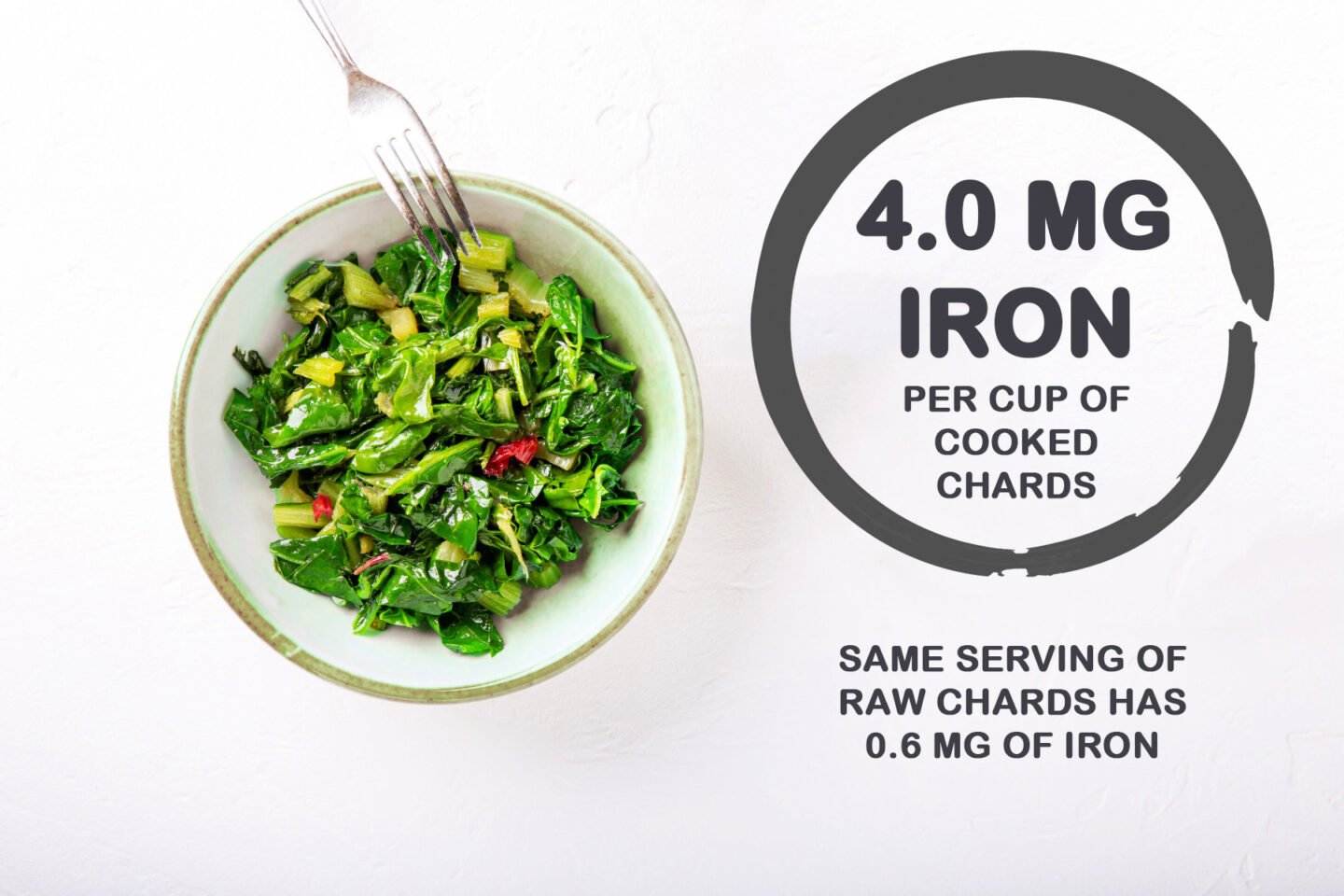
A one-cup serving of raw chard provides you with 0.6 mg of iron, and one cup of cooked chard contains 4 mg of iron, or 22% of the recommended daily intake.
Chard also contains many other nutrients, such as vitamin K, vitamin A, magnesium, potassium, and manganese.
It’s also loaded with powerful antioxidants, which can help prevent severe health conditions.
Conclusion
There are many healthy vegetables, and those above can help you prevent iron deficiency, anemia, and help keep your cardiovascular system healthy.
They’re also high in fiber, vitamins, minerals, and antioxidants – all of which work together to help you reduce your risk of severe health conditions.
So, consider adding some or all of them to your diet plan.
Sources: Nutrition Data, PMC, Research Gate, and National Library of Medicine
